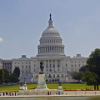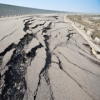AGI policy news briefs summarize geoscience policy activities and related events in Washington, D.C. as part of an effort to keep AGI member societies and other audiences informed about relevant federal policy and legislative updates.
To search for news briefs for a specific Monthly Review digest, enter the year and month of the Monthly Review in the search fields below.
Please note that as of April 2019, the publication of news briefs and the monthly review has been suspended. Policy news from April 2019 back to 2010 is available below; to browse Monthly Reviews from 1996 through 2010, please visit the Monthly Review Archive.
The Senate unanimously passes the Harmful Algal Bloom and Hypoxia Research and Control Amendments Act of 2017, introduced on May 4 by Senators Bill Nelson (D-FL), Gary Peters (D-MI), and Rob Portman (R-OH).
The Senate Committee on Commerce, Science, and Transportation held a hearing on September 27 for four presidential nominations, including Howard “Skip” Elliott to head the Pipeline and Hazardous Materials Safety Administration, and Rear Admiral Timothy Gallaudet, an oceanographer and climate expert, to be Assistant Secretary of Commerce for Oceans and Atmosphere.
Senator Tom Udall (D-NM), along with four Democratic cosponsors, introduced the Hardrock Mining and Reclamation Act of 2017.
Representative Mike Conaway (R-TX-11) introduced the Carbon Capture Act (CCA). This legislation incentivizes Carbon Capture and Sequestration (CCS) projects, which use technologies to capture up to 90 percent of carbon dioxide emissions produced from industrial processes, including electricity generation.
On September 14, the Council on Environmental Quality (CEQ) published a list of actions that it will take to revise the federal environmental review process and authorization for infrastructure projects.
Senators Murkowski (R-AK) and King (I-ME) introduced a bill (S.1787) to reauthorize the National Cooperative Geologic Mapping Program (NCGMP) through 2023.
The House passed 8 remaining appropriations bills in a single package on September 14 to provide all discretionary funding for the Federal Government in fiscal year (FY) 2018.
On September 11, Senator Lisa Murkowski (R-AK) introduced a bill to reauthorize the National Cooperative Geologic Mapping Program through 2023.
Senator Dianne Feinstein (D-CA) introduced a bill to permanently reauthorize the National Earthquake Hazards Reduction Program (NEHRP).
Senator Dianne Feinstein (D-CA) introduced a bill to permanently reauthorize the National Earthquake Hazards Reduction Program (NEHRP). The bill calls for the creation of a set of maps showing active faults and folds, liquefaction risk, landslide risk, and susceptibility to seismically induced hazards.
The House Natural Resources Subcommittee on Energy and Mineral Resources discussed three bills introduced before the August recess. Two of these bills seek to amend to the Mineral Leasing Act of 1920, while the third bill proposes a new method for state onshore oil and gas leasing on federal lands.
President Donald Trump announced his intent to nominate Representative Jim Bridenstine (R-OK-1) to serve as the next Administrator for the National Aeronautics and Space Administration (NASA). If confirmed by the Senate, Bridenstine would be the first NASA Administrator to be appointed with a professional background in politics, rather than a science and engineering background.
After Congress returns from the August recess, the Senate will have 17 legislative days and the House will have 12 legislative days remaining before the September 30 deadline to agree upon and pass all discretionary appropriations legislation in order to avoid a government shutdown.
Hurricane Harvey made landfall on the Gulf coast of Texas as a category 4 storm on August 25, dumping massive amounts of rain on southeast Texas and surrounding areas. The projected disaster relief costs may put a large financial strain on Congress when it returns to session after the August recess.
In anticipation of Hurricane Harvey making landfall on the Gulf Coast, several federal science agencies prepared for the massive storm by monitoring its development and helping direct FEMA's resources to the likely hard-hit areas.
The White House issued guidance for reasearch and development priorities for fiscal year 2019, focusing on shifting projects to private industry and supporting basic research that can best serve the American people.
The U.S. Geological Survey (USGS) hosted two informational webinars about partnering with the 3-Dimensional Elevation Program (3DEP) for fiscal year (FY) 2018, and changes for this year's Broad Agency Announcement.
Four years after beginning an Environmental Impact Survey, the Bureau of Ocean Energy Management (BOEM) declared that the Gulf of Mexico is safe for seismic surveys.
Sixteen scientific societies sent a letter to EPA Administrator Pruitt questioning the need for a red team/blue team debate on climate science in light of the decades of peer review done on the subject.
The Senate confirmed two new members for the Federal Energy Regulatory Commission (FERC) on August 3. Neil Chatterjee, former aide to Senate Majority Leader Mitch McConnell (R-KY), and Robert Powelson from the Pennsylvania Public Utility Commission have joined Commissioner Cheryl LaFleur, bringing the number of empty FERC seats down to two.
As the U.S. endures another fire season, legislators on the Hill are seeking to address some of the challenges associated with managing wildland fires on federal land. A hearing held by the Senate Committee on Energy and Natural Resources on August 3 tackled the complex challenges in reducing wildland fire risk, focusing primarily on wildfire management programs and technologies.
The House of Representatives has been moving Fiscal Year (FY) 2018 budget bills out of committee more quickly than the Senate. The full House has passed one bill, for the Department of Defense; no appropriations bills have reached the Senate floor yet. Congress and the President must agree a budget or a Continuing Resolution by September 30 to avoid a government shutdown. More detail on agency budgets is available here.
On July 13, Interior Secretary Ryan Zinke announced that Craters of the Moon National Monument in Idaho and Hanford Reach National Monument in Washington are no longer under review by the Department of the Interior (DOI). The announcement of another unaltered monument, the Canyons of the Ancients in Colorado, came days later.
On July 20, the Senate Committee on Energy and Natural Resources held a hearing to consider nominations for key positions at the Department of Energy (DOE) and Department of the Interior (DOI).
On July 20, the House Natural Resources Subcommittee on Energy and Mineral Resources held an oversight hearing to discuss the future of hardrock mining in the United States. Streamlining the permitting process, royalties reform, and reclamation concerns were among the topics discussed at the hearing.
The House Natural Resources Subcommittee on Energy and Mineral Resources held an oversight hearing on July 12 to evaluate the potential development of offshore drilling on the Outer Continental Shelf (OCS).
The White House Office of Science and Technology Policy (OSTP) continues to operate without a director and has recently lost some science division staff.
On July 7, the Executive Office of the President published Executive Order 13803, which was signed by President Trump on June 30 reestablishing the National Space Council.
Interior Secretary Ryan Zinke signed Secretarial Order 3354 on July 6 to promote energy exploration and development through better management of leasing programs for onshore oil and gas resources and solid mineral resources on federal lands.
The House Appropriations Subcommittee on Interior, Environment, and Related Agencies held a hearing on June 15 to evaluate President Trump’s budget proposal for the Environmental Protection Agency (EPA).
On June 15, the Bureau of Land Management (BLM) posted a notice in the Federal Register indefinitely postponing certain compliance dates within the Methane Waste Prevention Rule.
An interim report by Interior Secretary Ryan Zinke released on June 12 provides preliminary recommendations regarding the review of the Bears Ears National Monument in Utah.
On June 8, Department of Interior (DOI) Secretary Ryan Zinke testified before the House Committee on Appropriations Subcommittee on Interior, Environment, and Related Agencies at a hearing on the DOI Fiscal Year (FY) 2018 budget.
On June 7, the House Appropriations Subcommittee on Commerce, Justice, Science, and Related Agencies held a hearing to discuss the President’s fiscal year (FY) 2018 budget request for the National Science Foundation (NSF).
On June 7, the House Committee on Natural Resources Subcommittee on Energy and Mineral Resources held an oversight hearing about the Office of Surface Mining Reclamation and Enforcement (OSMRE) Abandoned Mine Lands (AML) Program. The AML Program is set to expire in 2021.
President Trump announced his intent to withdraw the U.S. from the Paris Climate Accord on Thursday, June 1.
The Department of Energy (DOE) requests public comments and information regarding the implementation of President Donald Trump’s Executive Order 13771, “Reducing Regulation and Controlling Regulatory Costs.”
On May 25, the Senate passed the Digital Coast Act (S.110) to help coastal communities prepare for storms, adapt to rising sea levels, and strengthen economic planning efforts.
The House Natural Resources Subcommittee on Energy and Mineral Resources held a legislative hearing on a discussion draft of the Community Reclamation Partnerships Act (H.R.__) to be introduced by Representative Darin LaHood (R-IL-18).
The House Natural Resources Subcommittee on Oversight and Investigations held a hearing on May 24 to examine three major laws affecting the management of federal and tribal lands, as well as designated wilderness areas.
On May 23, President Donald Trump unveiled his full budget request to Congress for fiscal year (FY) 2018.
The President’s budget request seeks to completely eliminate NASA’s Office of Education (OE) and its portfolio of programs and projects.
President Trump proposed a budget of $922.2 million for the U.S. Geological Survey (USGS) in his request for fiscal year (FY) 2018, which is a 15% cut from the FY 2017 enacted level.
As directed by the President’s Executive Order 13792, the Department of the Interior (DOI) is conducting a review of certain national monuments designated or expanded since 1996 under the Antiquities Act.
On May 4, Senator Marco Rubio (R-FL) introduced the Florida Shores Protection and Fairness Act (S.1041).
Representative John Delaney (D-MD-6) introduced the Climate Solutions Commission Act (H.R.2326), which aims to accelerate the reduction of greenhouse gas emissions, on May 3.
The Senate passed the Space Weather Research and Forecasting Act (S.141) on May 2 to develop an integrated strategy for the coordination of federal government activities to improve the nation’s ability to prepare for, mitigate, and respond to the impacts of space weather events.
On May 1, Congress agreed to advance an omnibus appropriations bill for the current fiscal year (FY) 2017, which will fund the government through September 30, 2017.
On May 10, the Department of the Interior (DOI) announced that it will reconsider applications from ocean seismic survey companies to carry out geological and geophysical activities off the Atlantic coast.

























